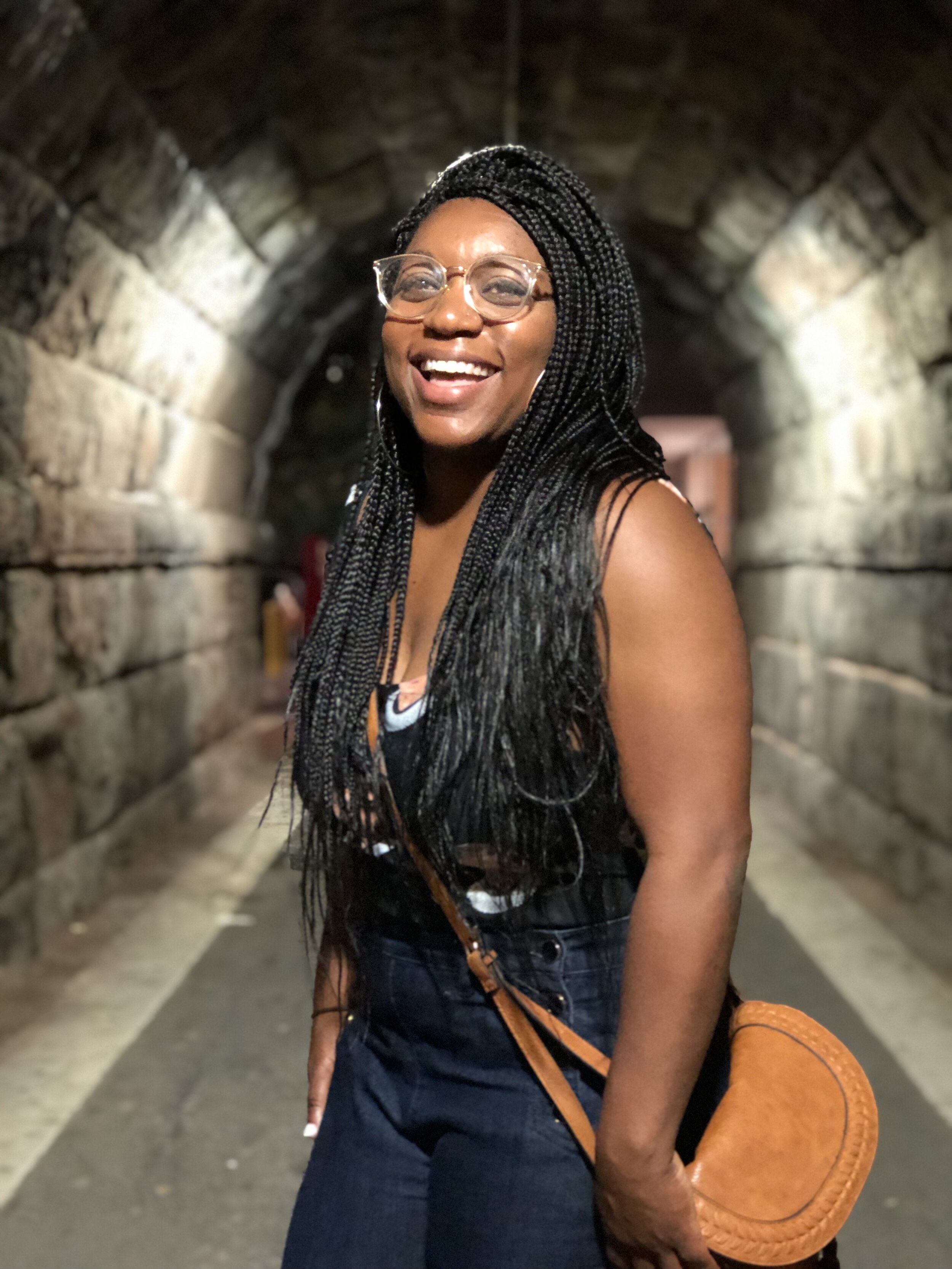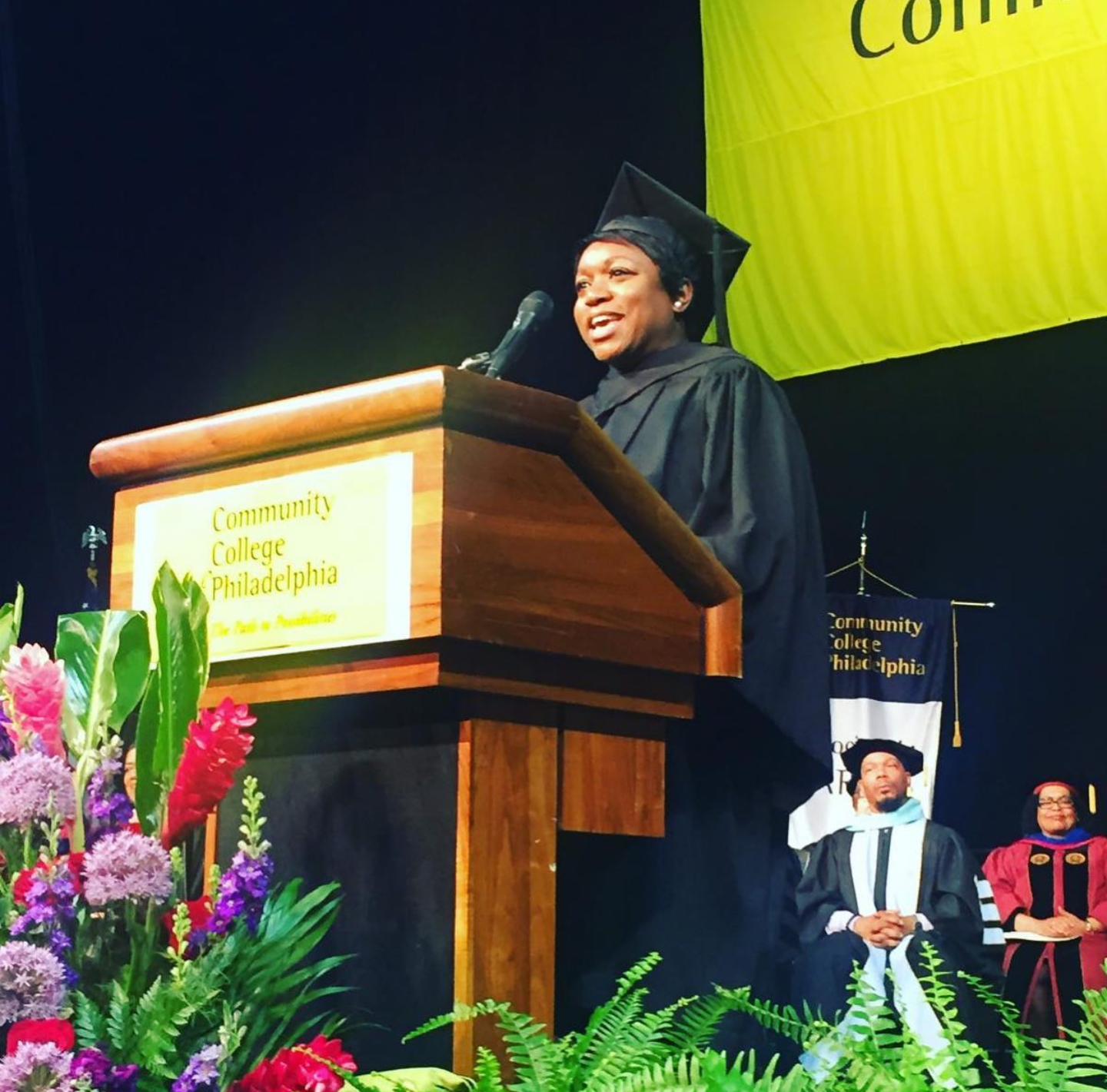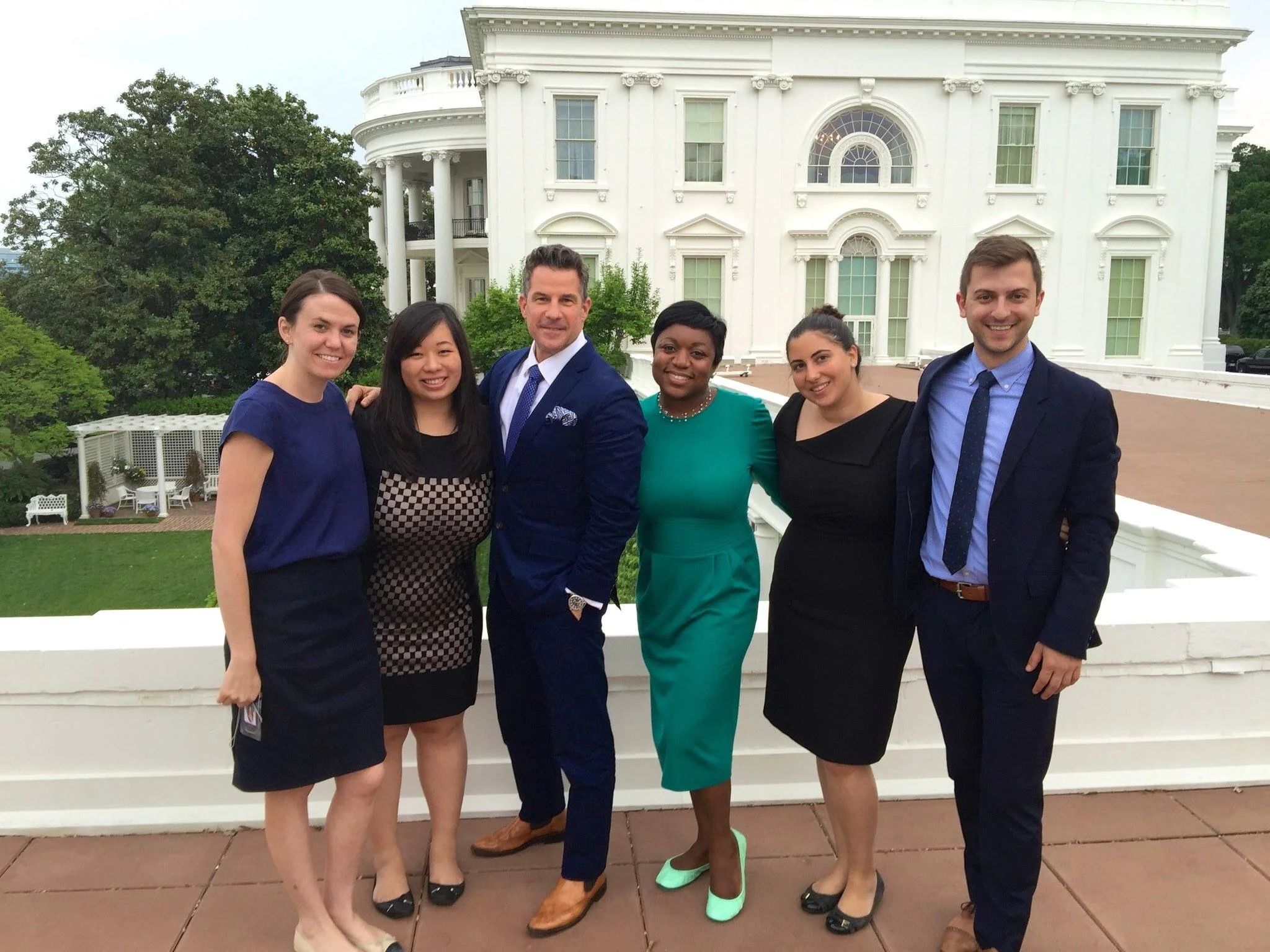Deesha Dyer Shares How to Live the Life You Want by Daring to Be Different
Deesha Dyer is the Philly girl whose improbable path led her to the White House where she served as social secretary under the Obama administration. Her story of graduating from community college in her late 20s to starting a prestigious internship at the White House when she was 31 is even more impressive because she did it - without a hookup- by being and believing in herself. If Kanye West’s song “Everything I Am” was a person, it would be Deesha. Now in her early 40s, Deesha, whose Hindu name means direction, explains how she charted her own course and shares: what she’s learned along the way, her self-care routine, the one piece of advice she would offer other Black women and girls, and how we can all get more involved in our communities.
Culture & Community
Growing up between Philadelphia and Hershey, Pennsylvania, where she attended the Milton Hershey boarding school on full scholarship, Deesha leaned into what came natural for her, even when she got in trouble for it.
Photo courtesy of Deesha Dyer
“My teen years were like everybody else’s teen years - they were learning years, and they were evolutionary years,” Deesha said; years where she did a lot of activism around HIV/AIDS, and hip hop. Deesha found power in organizing and questioning things - systems, authority, and why things had to be the way they were.
“Right now we're in a stage of, you know, Black girls matter, Black girls speak up and use your voice, but really, that's new. So, during my senior year, there's a lot of getting in trouble for doing just what we encourage people to do now, which is speak up and be loud, and be bold and be yourself.”
In her 20s, the hip hop community in Philly- which she describes as unique, gritty, and raw - helped raise her. The underground hip hop community became her family and the culture, which she reported on, became who she was.
“I’ve always wanted to be in community, figuring out how we can help the next person; how we can help those who didn’t have things. I didn’t have a lot either, but I was able to help whoever I could with what I had. ”
Who is Deesha Dyer?
I identify as a Black woman, above all else.
I identify as a survivor of many things. I identify as an organizer and an activist and as someone who doesn't wait. I don't wait for permission. I don't wait to have everything together before I do what I need to do.
I would describe myself as constantly changing. So you could ask me the same question in two weeks and the answer could be different. But that is the beauty of the human condition, we change and we evolve as we go.
The best word to describe me is unconventional.
Choosing College
Deesha dropped out of college at 18 and at 29/30 years old, she “swallowed her pride” and went to the Community College of Philadelphia - a decision that changed her life in ways she never expected.
Photo courtesy of Deesha Dyer
“Community College, if we’re being honest, is still looked at as a 13th grade, and something that is a little bit lower class and getting to a four year school,” Deesha said. At the time she was working as a secretary- a great job, she says, but she wanted “to get to a different place” - including becoming a social worker and in order to do that, she had to go to school. That was the motivation and drive she needed, but like many people, Deesha says she was uneducated about all that community college had to offer.
“I brag about community college now, I talk about it all the time. It opened doors to me that didn’t know, but I think that it speaks to us getting over ourselves, and, not seeing what’s on the other side, but having faith that it’s gonna work out. And obviously community college did work out, because that led me to the White House.”
Career & Confidence
Photo courtesy of Deesha Dyer
In 2009, Deesha began an internship in White House’s Office of Scheduling and Advance.
I stepped into the White House as a 31 year old. I was obviously very insecure, because I didn't know what people did at the White House. I didn't know if I was supposed to be there. I didn't know, if I was going to live up to the responsibilities that were put before me. I was very scared, very insecure, very nervous. I think that changed once I got into the White House and met all the other interns who were a lot younger than me, but still had those same feelings. I realized that I brought those feelings upon myself because I was always used to hearing I was too loud and too bold. When I got there, I thought, I don't want to walk in here being like that, so I was super quiet and reserved. The other interns and my supervisor encouraged me to be who I was. And that led me then to having a great internship and then that obviously then led to a full time job. I worked at the White House for seven and a half years. I was very thankful. I was very excited to work for the Obamas. Once I left, it was a great feeling of knowing that I was part of history, and I helped the President and First Lady write history, and I was able to bring my community along the way.
Conquering Criticism
Creating Change
After leaving the White House, Deesha co-founded BeGirlWorld.com to help teen girls imagine and see life from a global lens. Deesha, whose first trip outside the country was a graduation cruise to Bermuda, shares why.
Photo courtesy of Deesha Dyer
“I co-founded BeGirl.World with one of my really good friends who’s a mom of two Black girls. She's always taken them traveling, and she always wanted to make sure that other girls had that same opportunity, even if they didn't have the finances to travel, and to know that travel is an option. The other part is that I've always loved travel - I love hospitality and tourism - but I never could afford to do it. So I figured out ways to maneuver it once I was old enough to do it on my own and I wanted other Black girls to have those same opportunities. I also would travel with President Obama and the First Lady around the world and I would never see Black people in the US embassies. And I was always very confused as to why. I later discovered that there are not a lot of Black people in the Foreign Service and even before that, only 7% of study abroad students are black. So that’s how we came with it, from the combination of a bunch of things.”
Philly Jawn
Being a Philly girl is a rare kind of honor. I think a Philly girl is somebody who's tough and is always ready to defend, if needed. I think that we have a certain loyalty about us. We come from a very storied history of African Americans in Philadelphia - our music, our culture, our dance, arts of our festivals - and I'm a product of all of those. I'm also a product of the smaller communities that are in Philadelphia - West Philly, North Philly, Mount Airy, Germantown, Manayunk, all Southwest Philly, so I’m a product of that. That's what being a Philly girl means to me, really it's a pride and it's an honor, and it's just a rarity that I hold tight to my heart.
What one message would you share with teen girls, or younger Black women?
The thing that I will say is that waiting on any kind of person to give you power to make change is for the birds. Waiting on an influencer, waiting on having followers, waiting on getting degree - you'll die waiting. Whatever you have and whoever you are, that's enough to ignite change. Lean into that and discover how wonderful you are without having all these things added on, or without all this validation from other people saying you did a great job. I can post something on Instagram and if it gets 50 likes, I'm fine with that; if it gets 1000, I'm fine with that. Get to that place where you're secure enough to say: I want to do this, my talent is good enough for this, I deserve this. Detaching yourself from public validation will do a lot for your confidence.
The other piece of advice is learn about financial management when you're young. Learn about credit and learn about retirement funds, and all these things that seem so far off. Set yourself up to not have to depend on a full time job and be in debt when you get older.
What advice would you give older women reading this?
I think the same thing. We talk a lot to young people, but there are some people who are in their 30s and 40s and 50s who, for the first time, are discovering who they are after having to be bound to people's opinions and their own perceptions of what they're supposed to be. The advice I would give is that it's never too late. Stop thinking there’s a timeline on our greatness, or there's a timeline to discover yourself. People always say to me things like, ‘if I was younger, I would have,’ and I'm like, just do it. Remove these timetables of what you think is the proper way and the proper path to do things. Because if this year has taught us anything at all, is that time is not promised to us. I don't know when the good Lord is gonna take me out, so I'm not trying to live by nobody's expectations anymore. I want to be able to say, I've lived my life exactly the way I wanted to live my life. That's the advice that I give. That's the advice that I follow.
If you had to do things all over again, would you change anything?
I think that I want to give the PC answer and be like, Nah, I wouldn't change a thing, but I won't lie. I think that I would change the way I approached things. Obviously things worked out great and I'm very thankful for the path that I took, but I would have probably have gone to community college right out of high school. I probably would have gotten my credit together before it got bad. I think I would have lived overseas, at some point in my life - I wish I would have done that. And I wish I would have taken better care of my health, younger, so I didn't have to take medicine. And I think that I would also not look at the standard in which I thought I should live- like get married, have kids- a lot sooner than I did.
You taught a course called “Imposter to Impact” while you were at the Harvard Kennedy School Institute of Politics. What does that mean and how do you relate to it?
Photo courtesy of Deesha Dyer
I think that I grew up with imposter syndrome. And I grew up shrinking myself a lot, because I was always told that I was too loud, bold, and disruptive. I didn't realize that those things were actually qualities of a leader and qualities of somebody who could have an impact. Feeling like an imposter, or having a lack of confidence, is actually a natural feeling. That’s a feeling, though, that you have to lean into and get to the root of - Why do you feel like an imposter? Why do you feel like you don't deserve these things? And then switch the narrative within yourself, to then bleed over into to the world that have an impact.
I didn't realize what an impact my story and who I was would have. I didn't realize that until people started saying, you should speak. I just always lived my life. Once I realized that I have a story to tell, that’s when I knew that it would make a good study group for the students, because they're going through the same thing.
What does your self-care look like?
Photo courtesy of Deesha Dyer
My self care looks like blocking off time on my calendar for no work, I'm just saying no schedule on my calendar. And I have it every day. My self care looks like stopping my work and eating with my partner every night, making sure that I put my computer down. It looks like sleeping. I tried to sleep eight hours but it doesn't really work, so I do lay in bed and just try to be still. I work out almost every day. I pray every single day. I meditate every day. I do deep breaths every day. I call all of my friends and keep in touch with them through group chats or WhatsApp or whatever. I eat whatever I want, when I want. I try to take care of myself, but also not deny myself just things in life. For me, my self care is really rooted in me doing what I want to do and not caring about what others think. I think that is more freeing than any massage or spa that I found.
A lot of the work that you do is obviously very rooted in community. What are some small ways we all can support our local communities and get involved?
Take care of yourself. You're a part of community, and if you took care of yourself as much as you want to take care of other people, you’d be in better health and not burn out in the long run.
Look at what's already happening in the towns and around you and see how you can help. How can you be a part of what's already going on? I think too often, we start new movements and we look for these new ideas, and what influencers are doing and we want to be part of that, but there are local networks, local positive people, that need your resources, your skills, your time, your funds. I think too often, we don't give them as much love as we would if a celebrity came in and endorsed something. So start local, start with what you know how to do and offer your services. Maybe you don't have any money, but maybe you have a platform where you can push something out, maybe you're really good at communication, maybe you're really good at drawing'; offer your services to a local outlet and I think that they will probably be able to use it.
Find something that speaks to you. Find something that makes sense to you, and then structure your time accordingly, where you don't get too obsessed with it and do all the time. Structure your time or you're able to take some time off so you don't get burned out doing community activity.
“Community is whatever you want it to be. Community can be where you’re from; community is what you create. Community, to me, it is home.”
Photo courtesy of Deesha Dyer
Last year, Deesha founded Hook & Fasten, which allows her to combine the things that she loves, is good at doing, and is experienced in, and make money doing it. “Social impact has been my life for over 20 years. I didn’t even know that what I did had a name. I just always did what needed to be done. Meanwhile, it’s a whole legit business out here!”
“I also realized that the standards I was trying to live up to a lot of times were standards other people set, and so I had to take a step back from that. Because when you try to live up to the standards of other people, you'll probably never feel like they're good enough because the bar is always moving and you're looking at what they see of you, not what you see in you. I had to also step back and really focus on like, the expectations I have for myself, and the standards I have for myself and evaluate why am I letting other people dictate the standards of how I live, what I can do or my potential?”
To keep up with Deesha, check her out on Instagram. To support her work, follow BeGirl.World on social media.
If you enjoyed that story, SUBSCRIBE for more!
Sign up with your email address to receive news and updates.










